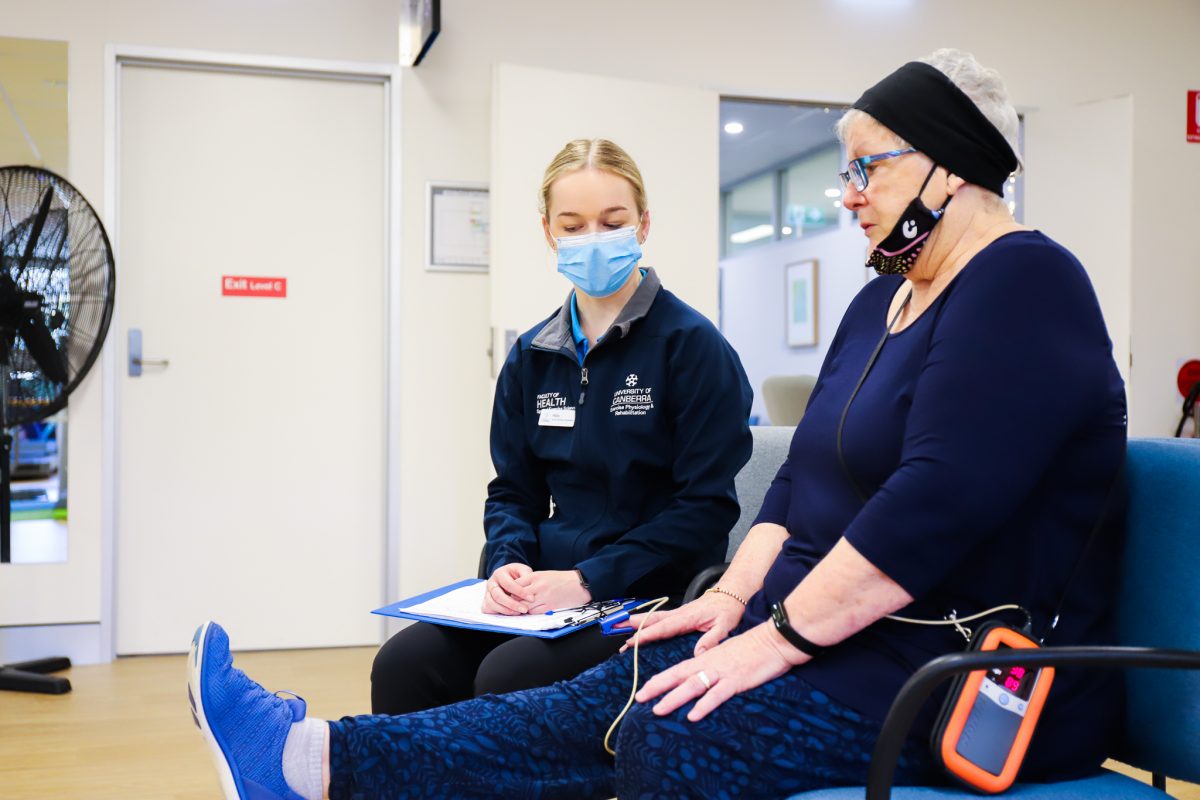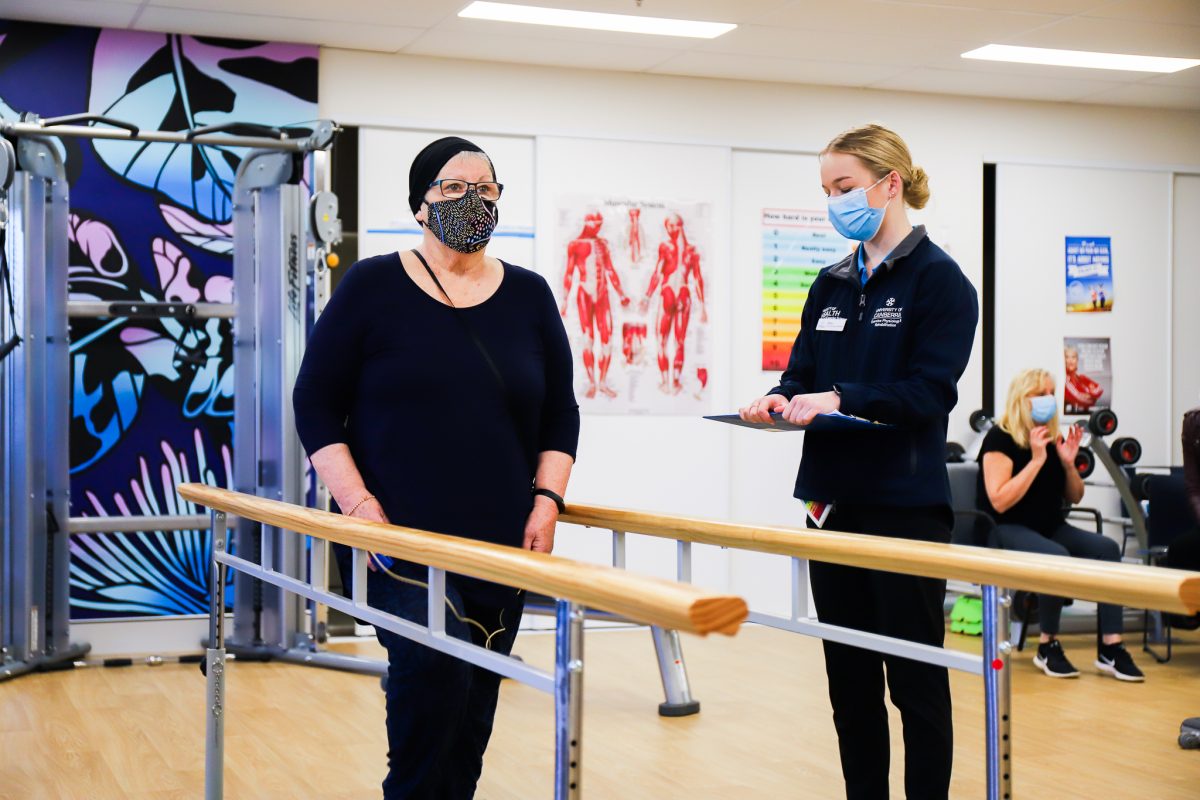
University of Canberra exercise physiology student Abby Thomas assisting a patient at the on-campus cancer clinic. Photo: UOC.
A lifelong passion for sport and a desire to help others led Abby Thomas to pursue a career in exercise physiology.
A fourth-year student at the University of Canberra, Abby has recently completed work placement at the university’s on-site cancer clinic, where she had an opportunity to put her knowledge into practice.
An emerging field, exercise physiology is often confused with physiotherapy, but University of Canberra lecturer Dr Alexander Engel said both allied health professions had important, yet very different, roles to play in rehabilitation.
“Exercise physiologists use exercise as our tool to treat long-term injuries and chronic illnesses such as cardiovascular disease, diabetes, arthritis and cancer,” Dr Engel said.
With a number of on-campus clinics, Dr Engel said students such as Abby had a fantastic opportunity to put their new skills into practice, and work directly with patients, while being fully supervised by clinicians.
“At the cancer clinic I’ve been helping a range of patients that are in different places in their cancer journeys,” Abby said.
“I’ve really enjoyed working with clients and providing them with a safe place to exercise and work on their functional capacity so they can maintain their independence.
“Working in cancer has definitely been a different experience for me, and something I hadn’t really thought about. I’ve learned a lot about cancer and how exercise can be used to help patients who are undergoing treatment, recovering from treatment or following surgery.
“There’s such a broad range of cancers and everyone is in a different place, so we have to do physical assessments and design individualised programs for each client.”
Abby has been working with a stage-four lung cancer patient who has been attending classes at the university for 18 months after the cancer metastasised into their spine and pelvis. Exercise helps the patient with breathing.
Abby has also had an opportunity to work with elite sporting teams, including the Canberra Capitals WNBL side and ACT Brumbies rugby union players during her uni placements, which has been right up her alley.
“I’ve always played sport and been into fitness, so working with sportspeople at this level has been incredible,” she said.
“I did a placement last year in strength and conditioning with the Brumbies, which was a great opportunity to see where you can go as an exercise physiologist in elite sport.
“In Canberra there’s a lot of opportunities to connect with elite sporting teams, and it’s a great pathway to get into that field. Being immersed in that environment is definitely a great way to learn.”
Abby plans to follow a path in spinal injury rehabilitation, but said the specialised degree, which included units in exercise programming and prescription, nutrition and sport, and performance psychology, offered a huge range of opportunities.
“It’s a really great emerging field where we can use the most recent research to prescribe exercise to help people with such a huge range of conditions, from sporting injuries and serious accidents, to chronic diseases,” she said.
Dr Engel said there was a growing need for exercise physiologists to treat metabolic diseases such as diabetes, as well as chronic pain and arthritis.

Abby has been creating individualised programs for cancer patients as part of her work placement. Photo: UOC.
Many patients underestimate the benefits of strength training in managing their condition and many don’t take into consideration the risks associated with the wrong type of exercise, especially if they have multiple conditions.
As part of their degree, students learn to formulate individualised, holistic programs for patients to help restore their strength and endurance, lower fatigue levels and increase blood flow which, for cancer patients, can improve the flow of medicine around the body.
Patients can come to the university clinics to access more affordable treatment, while also providing students with real-life learning experience.
The University of Canberra attracts about 60 exercise physiology students each year, many of whom go on to work in hospitals and medical clinics, with sporting organisations and disability schemes, as well as in the insurance and compensation industries.
“It’s a very rewarding career path and there’s a lot of roles out there,” Dr Engel said.
“When I worked in practice, I wasn’t just working with one cohort, I got to work with a lot of different people, from elite athletes to people recovering from surgery, or injury from a major accident.
“It was great to be the person that changes someone’s life.”
Graduates can choose to specialise in one particular field, such as cardiovascular, cancer or elite sport, or their training can be a stepping stone towards further study.
They can get a taste for different areas during their 500 work placement hours in either the student-run uni clinic or Canberra’s hospitals.
Students also run education classes for people with a range of conditions, including bone health and diabetes, and they work with up-and-coming young athletes and Lyneham High School.
With hundreds of degrees to choose from, the University of Canberra provides a practical, industry-connected approach to learning.
Original Article published by Katrina Condie on Riotact.







